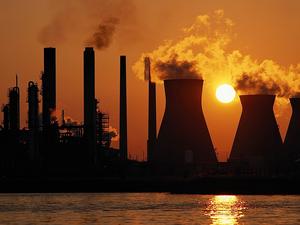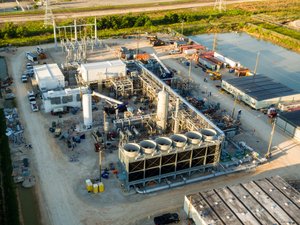
With the closure of a SPAC deal, Durham’s Net Power is debuting on the New York Stock Exchange – a move that could propel it toward its lofty goal of orchestrating a network of net zero power plants across the globe.
The combination brought proceeds of $675 million, according to Net Power. The firm hit the NYSE Friday under the ticker NPWR as a company with a market cap $2 billion.
It’s a big deal – and the culmination of years of work. Spearheading the effort on Net Power’s end is CFO Akash Patel. Thursday brought him a sea of paperwork tied to the transaction. But it was welcome work, as it was the final stages of going public, a goal Patel has been working toward since joining the clean-tech company in 2020.
“We’re on track to close today and start trading tomorrow,” Patel said Thursday while driving to New York City for the big day. Patel has made energy finance a career, having started at Citigroup and later working as an investment banker with Barclays.
“I had known about Net Power and knew that when this was ready for commercialization, it would be a real game-changer,” he said.
![Akash Patel Headshot[2]](https://media.bizj.us/view/img/12533543/akash-patel-headshot2*540xx900-1200-150-0.jpg)
When he took the CFO role, Patel was charged with making sure the firm had the capital it needed to get here – and that meant readying the company for “just this type of event.”
Net Power is a 13-year-old company that for much of its history has heavily leveraged its strategic backers. It’s closed four outside funding rounds – each one led by a strategic investor, such as Occidental, which recently funneled an additional $250 million into a PIPE transaction tied to the SPAC deal.
Going public through a SPAC transaction – where Net Power combines with a special purpose acquisition company that’s already public in order to fast track it to the New York Stock Exchange, is a new opportunity for Patel.
In the case of Net Power, it’s combining with Rice Acquisition Corp II, a firm led by seasoned energy investors the Rice Family. With the closure of the deal, Danny Rice takes on the CEO seat.
That’s the biggest change the company will see day one, Patel said.
“When we were going through this process, it was really important to have a strong, strategic investor,” Patel said. “When we think about the Rice family and Danny coming in as CEO, we view this as just a SPAC in name only. Really it’s a strategic investor that knows the natural gas market. … Danny has built a company through a hockey stick growth phase before.”
The Rice family’s first SPAC, Rice Acquisition Corp 1, acquired renewable gas producer Archaea – later acquired by oil giant BP in a $4.1 billion deal, including debt.
Without the Rice family’s history, Net Power wouldn’t have been on board with the combination, Patel said.
How Net Power works
Net Power claims to have cracked the code on carbon emissions, with a system that combines natural gas with pure oxygen in a combuster, producing carbon dioxide and water. It’s mixed with recirculated carbon dioxide and used to spin a turboexpander, producing power. When the turboexpander exhaust cools, water and byproducts are removed, leaving carbon dioxide, which can then be compressed and recirculated back to the turboexpander. While most is recirculated, a small portion exits the cycle and is captured, where it can be sold back to the industry.
Net Power has bold ambitions and is already planning its first plant, a $950 million project in Texas that is scheduled to come online in 2026. Rice previously told Triangle Busines Journal the plan is to roll out additional plants across the globe and to go into “manufacturing mode” after the Texas plant is delivered.
Net Power is still exploring where to locate additional clean-tech plants – and hasn’t made “any determinations on how to slot those,” Patel said.
“The strategy is, build the backlog and be sold out by the time we get the first one built,” he said. “It’s really to find the right partners, the right customers who are going to deploy fleets of plants.”
Patel said the impetus is on speed – which is why Net Power needed a move to capitalize quickly. “Decisions for how to get to net zero in 2040 and 2050 are being made today,” Patel said. “And Net Power’s technology is so important.”
Net Power also plans to leverage the credibility of trading on the NYSE alongside major companies that are household names, he said.
“Our customers want to interface with a company that is going to be around for the long haul,” Patel said. “We are selling a license for a plant that is going to be operational for 25 to 30 years,” he said.
But despite the buzz around Net Power, it’s a new technology – and that always means risks. SPAC deals themselves have been hit with extra scrutiny in recent months, as many SPAC companies have floundered. Startup-turned-SPAC Virgin Orbit Holdings, for example, filed for bankruptcy.
But SPAC deals haven’t stopped.
VinFast, the Vietnamese automaker planning to build an assembly plant in Chatham County, recently said it was ditching traditional IPO plans and going the SPAC route instead.
As for Net Power, existing investors, including Occidental, Baker Hughes, Constellation and 8 Rivers (a subsidiary of SK Group), have rolled 100 percent of their equity into the combined company.
NET Power recently announced a planned joint venture with SK Group to pursue the origination and development of utility-scale NET Power plants across Asia.




